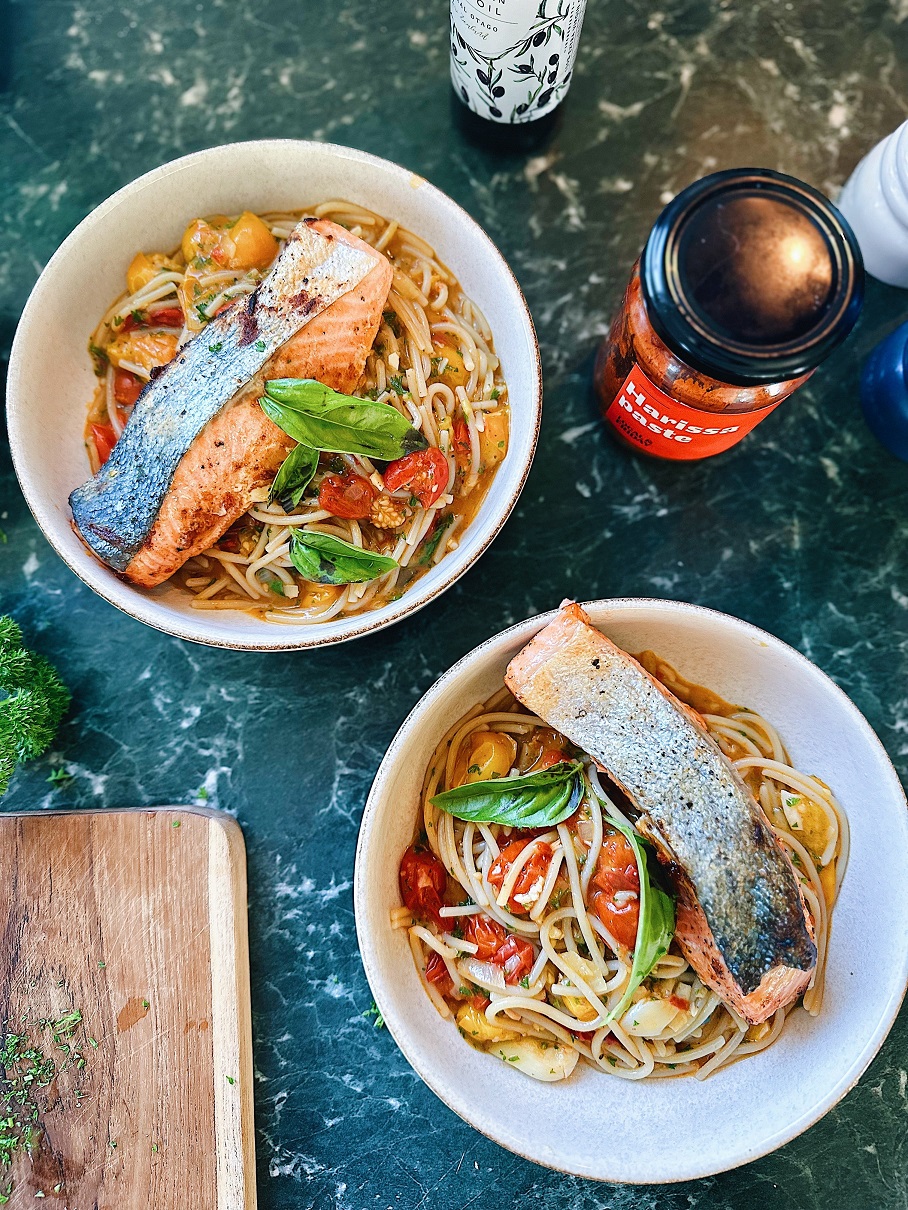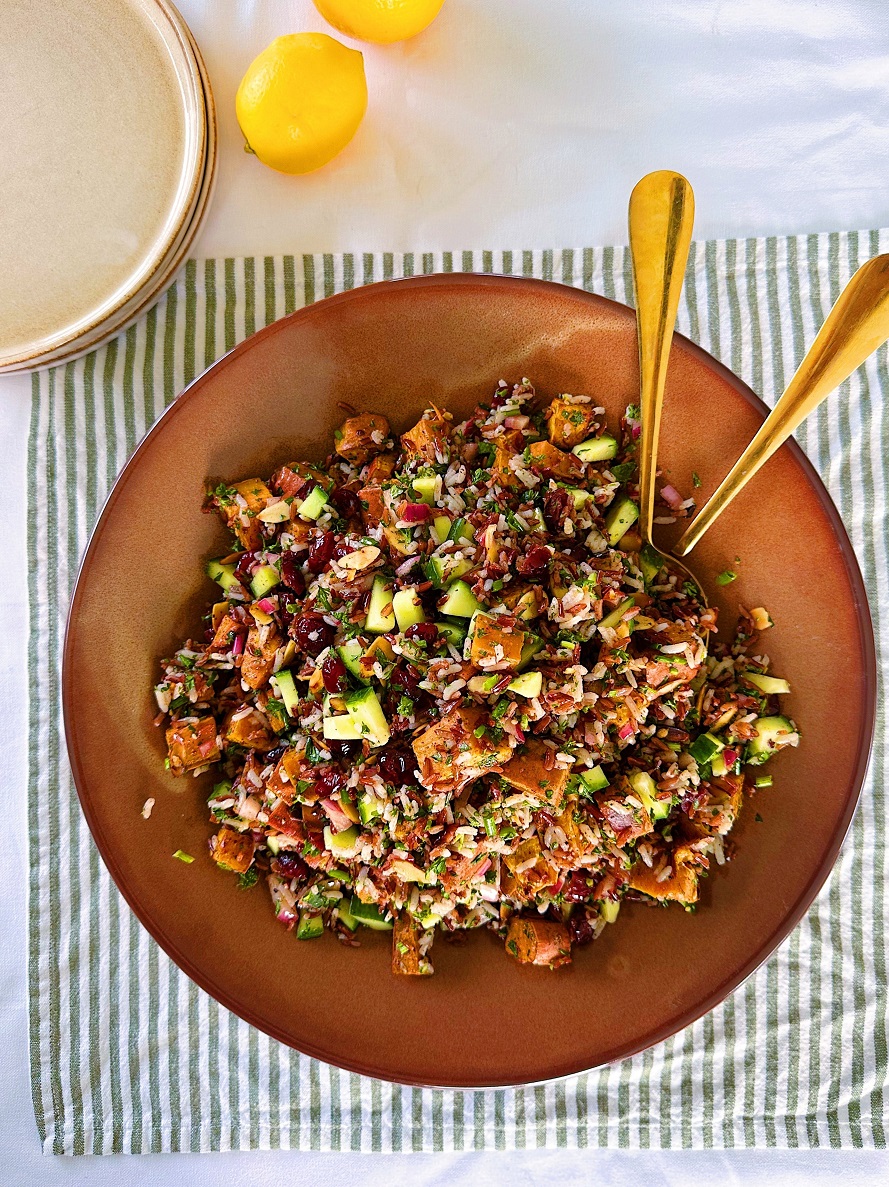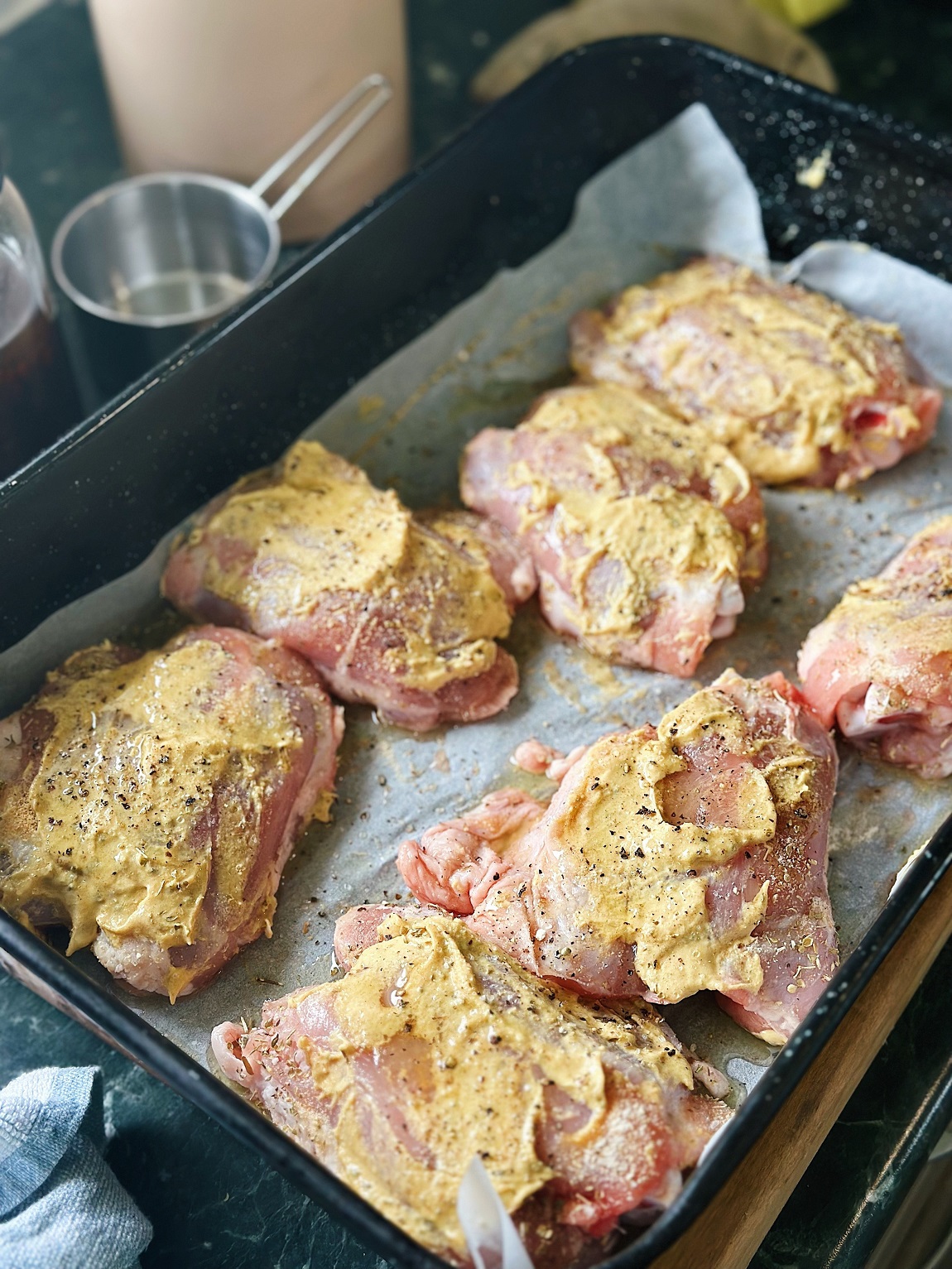
Salmon, harissa and cherry tomato spaghetti

Enjoy this moreish pasta recipe, full of flavour, using a unique pasta-cooking method. Spaghetti becomes a flavour sponge rather than the classic boiling in water; infusing flavour into the spaghetti reduces the need for excess sauce while delivering a delicious meal and reducing the dishes.
This is made even more accessible with the sauce and salmon baked together in the oven, keeping the tomatoes and salmon in shape while infusing all of the additional flavours together, concocting the perfect roasted juices to coat the pasta.
Once the pasta has soaked up all the flavourful liquid, add the roasted tomatoes and their juices for a finishing touch. Sprinkle in some soft herbs for freshness, and serve it with the baked salmon on top. For a twist sans salmon, add a few dollops of soft goat cheese and voilà: you've got a dish that's simply irresistible.
Suitable for GF
Ingredients
2 portions salmon, skin on
400-500g cherry tomatoes
3 cloves garlic
2 slices lemon
1 heaped Tbsp harissa paste
Extra virgin olive oil
Salt + pepper
170g brown rice spaghetti (gluten-free)
3 cloves garlic, crushed
1 shallot or small onion, diced
20g butter
1 Tbsp extra virgin olive oil
1 tsp flaky sea salt or 1/2 tsp fine salt
½ cup white wine
1¾ cup water
Parsley + basil
For the salmon & tomatoes:
Preheat oven to 210 degrees Celsius on fan bake.
Add cherry tomatoes, salmon, garlic, lemon, harissa paste and olive oil to a small roasting dish. Season well with salt and pepper and place salmon skin side up.
Bake for 20-25min until salmon is just cooked and cherry tomatoes start to burst. Remove from the oven and set aside until needed.
For the spaghetti:
Saute onion and garlic with butter and olive oil in a medium saucepan over medium heat for five minutes, stirring often.
Add white wine, bring to the boil and then add the water.
Once boiling again, break the spaghetti in half and scatter in the cooking liquid. Mix around and make sure the spaghetti is as submerged as possible. Reduce temperature to medium-low and cover with the pot lid. Cook for 15 minutes or until pasta is al dente and there is little liquid left; if you need to add more water during cooking, do.
**If you are using wheat pasta, this may take less time, so keep an eye on it.
Assemble:
Transfer the salmon to a plate. Add the cherry tomato mixture to the spaghetti, increase the heat to bring it to a boil, and stir to combine.
Add chopped parsley and basil, however much you like.
Taste and season with extra sea salt and cracked black pepper if it needs it.
Serve pasta in shallow bowls with salmon on top.
Optional extra: Serve with a dollop of either creme fraiche, buffalo cheese or soft goat cheese
Notes:
To make dairy-free, substitute butter for medium-strength extra virgin olive oil.
If using regular wheat pasta, start with 1 cups of water and add more if needed; wheat pasta will cook faster, so keep an eye on the cooking time.
 Spice roast kūmara, red rice & cucumber salad
Spice roast kūmara, red rice & cucumber salad

I always prioritise building a substantial salad that will keep well in the fridge for easy lunches and dinner additions.
When using grains there needs to be a punchy dressing full of flavour to give the mellow grains a lift.
Making this dressing and adding in your currants and red onion will allow everything to infuse while you wait for your grais and kūmara to cook as well as take off the sharp zing of raw onion.
This salad is beautiful with roasted kūmara or pumpkin and the addition of crunchy cucumber for a variety of textures. Serve this salad with mustard chicken for a great work lunch or a roast leg of lamb for dinner.
Ingredients
700g orange kūmara, skin on and cut into 2.5cm cubes
olive oil
2 Tbsp cumin seeds
1 Tbsp sweet paprika
½ cup (70g) flaked almonds
⅓ cup dried cranberries
½ cup basmati rice
½ cup red rice
1 cucumber
4 to 6 radish
2 large handfuls of Italian parsley, finely chopped
1 large handful of coriander, finely chopped
1 red onion, finely diced
Optional extra:
1/2 pomegranate, seeds only
Orange Salad Dressing
Zest of 1 orange
Juice of ½ an orange
6 Tbsp red wine vinegar
4 Tbsp olive oil
¾tsp ground cinnamon
1 tbsp runny honey
1 tsp wholegrain mustard
½ tsp sea salt
¼ tsp freshly ground black pepper
Method
Preheat oven to 200°C.
Toss together kūmara, 4 Tbsp olive oil, cumin seeds, smoked paprika and a generous pinch of salt and pepper in a large bowl.
Scatter on a large baking tray; ensure space between the kūmara pieces.
Roast for 20 minutes or until the edges of the kūmara pieces are browned and they are tender. Once cooked, set aside and cool on the tray.
Meanwhile, cook both kinds of rice following the packet instructions.
Toast flaked almonds in the oven on a medium baking tray for 3-5 minutes; while the kūmara is cooking, keep an eye on these so they don't burn. Set aside and cool.
Combine the salad dressing ingredients in a small bowl with a fork. Add the finely diced red onion and dried cranberries and set aside to marinate for 10-20 minutes.
Slice cucumber in quarters lengthways and then finely dice. Chop radish into fine matchsticks.
Add cooked and cooled rice, cucumber, radish, toasted almonds, parsley, and coriander to the marinating red onion, toss to combine, scatter cooked and cooled kūmara into the bowl, and gently mix.
Serve on a large serving plate or shallow bowl, and scatter with extra herbs or pomegranate seeds.
Note:
You can use pumpkin instead of kūmara.
 Mustard chicken
Mustard chicken

Mustard chicken has been my go-to easy protein to bake for years and for many reasons: bake ahead of time for an easy addition to a salad or pulled to add into soup or sandwiches, a leisurely dinner protein, requiring no skill and very minimal ingredients, yet full of flavour and finger-licking good, cooking the chicken at a high temperature until golden brown edges bring out the most amazing caramelised chicken flavour.
Do not pull them out when they are still pale, even if they are cooked through to the centre, as you miss out on all the concentrated flavour that comes with roasting long enough.
The best part is that your roasting dish will be swimming in the most heavenly juices, don't waste these; either pour over your chicken when serving or pour through a sieve and save for other uses.
This beautiful concentrated stock is perfect for soups, risotto, and cooking grains. I often freeze this for later use if it isn't used immediately.
Suitable for GF/DF
Ingredients
8 chicken thighs, bone in
8 tsp Dijon mustard
2 tsp each; onion powder, garlic powder, dried oregano
Salt and pepper to taste
Olive oil for cooking
Method
Preheat oven to 200°C fan-bake. Line a large roasting dish with baking paper.
Place chicken thighs in your roasting dish, evenly spaced apart.
Smear 1 tsp of Dijon mustard on each chicken thigh. Sprinkle garlic, onion powder, and dried oregano over the thighs, seasoning with salt and pepper. Drizzle olive oil on top.
Roast in the oven for 30-40 minutes until the chicken is golden brown and the meat is cooked to the bone.
Remove the chicken from the oven and allow it to cool for 10 minutes before eating. Pour the cooking juices over the chicken to serve, as the flavour is fantastic, or pour it into a small container and use it in soups or stews instead of stock.
If using later, let it cool completely in the dish before transferring it to an airtight container and storing it in the fridge for 2-3 days.
You could also pull the chicken off the bone and mix it with the cooking juices for easy use in the coming days.
Enjoy with fabulous salads for lunch or dinner.
Also great to use in soups or a pie filling.













